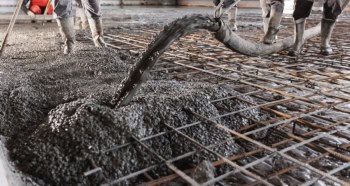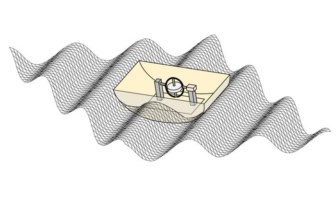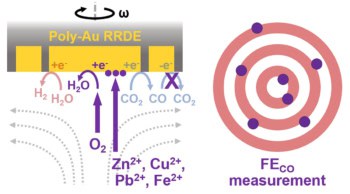A company wants to use “microlepton” technology to drill for oil in the British countryside but, as Matin Durrani reports, physicists have dismissed its claims as pseudo-scientific nonsense

Something very strange is happening in the heart of the English countryside. It involves local residents, professors of particle physics and two companies with Russian connections searching for oil. It might sound like science fiction but it is really happening.
The story revolves around a company called Technology Investment and Exploration Limited (TIEL) that is seeking permission to drill for oil at a site in rural Leicestershire. The oil will be located with “microleptons” – particles that are completely unknown to high-energy physicists. The company has already won outline planning permission from the local council to build a borehole, and has secured an oil-exploration licence from the government.
TIEL believes that conventional satellite photographs of the Earth contain recordings of invisible microleptons emitted by underground deposits of oil. These areas can be revealed, the company says, by shining a “microlepton generator” onto the photographic film. Having identified an area of interest, TIEL flies over the target area in a small plane or helicopter with a portable “microlepton scanner” on board to identify the exact location of the oil – or deposits of natural gas, gold and other minerals.
Nicholas Yellachich, UK managing director of the firm, told Physics World that the technology is based on work carried out by Martin Perl, who shared the 1995 Nobel Prize for Physics for his discovery of the tau lepton. “This is cheaper and more accurate than conventional oil-exploration technology,” says Yellachich. “It is the first time that this has been used in the West.”
Perl, however, denies any connection with the work. “There is no valid evidence in physics or chemistry for the existence of microleptons or microlepton fields,” he says. “The claims are nonsense. They have nothing to do with my work and have no place in what is known about lepton physics or the lepton family of particles.”
According to Alkor International – a rival firm that claims to have found oil in North Korea using the same technique – microleptons are “very small members of the lepton family”. They are supposed to weigh between 10-40 g and 10-30 g, which means that that the electron – the lightest of the leptons – is about 1000 times more massive than the heaviest microlepton. Millions of microleptons are said to surround every proton and electron in an atom, bonded by a force that is constant out to a critical distance and then zero beyond that region. If this bond is broken, says Alkor’s website, the microleptons can then form billion-strong clusters that pass unhindered through materials at faster than the speed of light. Moreover, gravity forces the clusters to travel vertically upwards.
TIEL intends to work for about 18 weeks on a 4.5 acre site at Vicary Farm, which lies between the villages of Quorn and Woodhouse Eaves about three miles south of Loughborough. The £1.5m project will involve building an access track, sinking a borehole to a depth of 3200 m and carrying out tests. The company promises to return the land to its original agricultural state when the tests are complete.
Scientific scorn
Physicists have been quick to ridicule the technology. “If microleptons existed, we would have detected them a long time ago,” says John Dowell, a particle physicist at Birmingham University. “It is complete rubbish to say that oil could give off these particles. In any case, if microleptons did exist and could pass unhindered through thousands of metres of rock, how can they be detected so easily by a hand-held detector on board a helicopter?” Dowell, whose cousin lives near the proposed drilling site, has written to Leicestershire County Council pointing out the scientific flaws of the company’s technology. “But the council decided to give outline planning permission anyway, ” he says. “It treated the scientific evidence as if it was just another point of view.”
TIEL, which is registered in Guernsey, was given the right to look for oil at Vicary Farm – and at two other sites in Gloucestershire and Wales – by the Department of Trade and Industry (DTI) in 2000. These licences were awarded for just £1000. But before TIEL can start drilling, it must first win full planning permission from the county council and apply to the DTI for a drilling licence.
Local residents – spearheaded by the Charnwood Forest Oil Action Group – are furious about the company’s plans. They are concerned that the drilling will increase noise and damage what is officially designated as an “area of particularly attractive countryside”, and they plan to ask the council to reconsider the planning application.
The action group has also been in contact with Robin Marshall, a particle physicist at Manchester University. “There is not a shred of evidence for the existence of microleptons,” says Marshall, “but the people behind this Russian company are cleverer than your average scientific buffoon. They knew how to get into the British planning system, and realized that the criteria for being awarded a drilling licence in the UK have nothing to do with science and that having such a licence will be of great benefit to them.”
After doing some digging of his own, Marshall discovered microlepton technology is based on a paper published by a Russian physicist called Anatoly Okhatrin in the journal Doklady in 1989. “He was clearly either mad, drunk or deluded,” says Marshall. “He spun a cone of lead weighing several kilograms in front of a pin-hole camera and claimed to have photographed a ‘glow’ surrounding the cone that was due to microleptons.”
Next stage
Last month the chair of the action group, Neil Davidson, and two local MPs discussed TIEL’s plans with the UK’s energy minister Brian Wilson. “He gave us assurances that the DTI would fully scrutinize the geological case for oil if and when it receives a drilling application from TIEL,” says Davidson. The DTI has also asked the Particle Physics and Astronomy Research Council to peer review “microlepton science”.
But it is still unclear why TIEL wants to search for oil in Britain. One theory is that a drilling licence from the British government could be used as a stamp of approval when marketing the technology elsewhere in the world. “It is strange that an oil company is relying on bogus technology”, says Davidson, “when all the available geological evidence suggests there is no oil to be found.”



